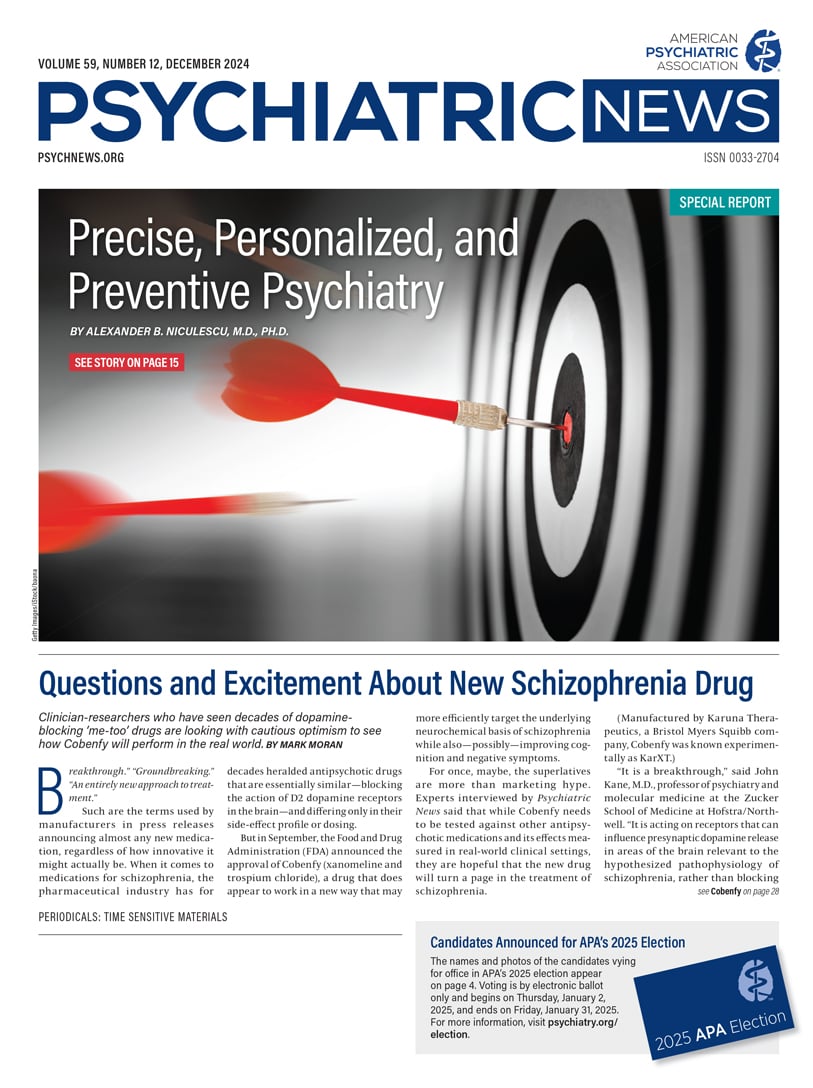I completed residency training in 1972. This was a very different era for American psychiatry. There were still more than a quarter-million patients in state and county mental hospitals with a length of stay in months if not in years. Psychotherapy, especially psychoanalytic psychotherapy, not only was a primary subject of study, but many of us also engaged in personal psychoanalysis as part of our learning.
But psychopharmacology was ascendant, especially with our inpatients, utilizing first-generation antipsychotics, antidepressants, and anti-anxiety medications. In 1970, the Food and Drug Administration approved lithium for use in treating what today is called bipolar disorder. Community psychiatry was also ascendant. In 1963, the Community Mental Health Act granted federal funding of community mental health centers across the United States.
Today, when the number of U.S. medical graduates entering psychiatry residency programs has increased each year for the last 13 years, the future seems very promising for our patients and our careers.
Better but Not Well
My career has spanned five decades of clinical practice, leadership roles in the public and private sectors, research, and advocacy for our patients and our profession. It has been a wonderful career, and I have no regrets about my choice of a medical specialty. But, as I “retired” in 2016 from my role as CEO of the largest nonprofit behavioral health system in the country, I was faced with something of a dilemma: how to continue to pursue my love of psychiatry in a way that acknowledged and addressed the challenges facing the profession in the second decade of the 21st century.
I asked myself a basic question: In the nearly half-century I have spent as a psychiatrist, have we made significant progress in the understanding and treatment of mental disorders? My answer is that our patients are “better but not well,” a concept coined by Gerald Klerman, M.D., in 1983. We have an improved psychopharmacology with many choices to treat complex disorders, a variety of evidence-based psychotherapies to help our patients, and many excellent, well-paying job opportunities for psychiatrists. As a profession, we are thriving.
Yet there are many challenges facing psychiatry today that I wanted to address during “retirement.” The suicide rate is up, not down. There are too few inpatient beds, and inpatient stays are ultra short-term. Too many of our patients are homeless or incarcerated. There are still not enough of us to meet the demand. And the list goes on.
82 Years Old and Going Strong
Since 2016, I have spent two years working one day a week as a prescribing psychiatrist at an inner-city community mental health center. I have worked as a part-time embedded psychiatrist in a multi-specialist primary care group practice.
I have a small, virtual private psychotherapy practice from home. At the University of Maryland, I supervise two PGY3 residents in psychotherapy and clinical work, and teach a mental health policy tutorial to PGY4 residents. I also teach Ph.D.s at the Bloomberg School of Public Health at Johns Hopkins a couple of hours a week and volunteer on nonprofit boards in Baltimore and elsewhere.
It adds up to an average of 15 hours a week, and I love it. With the rest of my time, I enjoy my seven grandchildren, read novels and newspapers, travel, and love life. Eighty-two years old and going strong.
During my career, I have served in a leadership role for many psychiatric organizations, including APA. Now I am president of Senior Psychiatrists, an organization open to all APA psychiatrists who have reached the age of 65. Gathering on Zoom calls and at the APA Annual Meeting, we share stories about our careers with each other and with younger APA members. We have a voice in the APA Assembly and write action papers. There are no dues, although we appreciate voluntary donations.
We like to think of ourselves as the most welcoming group in APA. There are 400 members today and more than 10,000 eligible among APA’s membership. To join, visit
seniorpsych.org.
Let’s stay in touch with each other. ■

